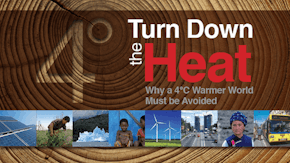Mankind faces several crises at the present time, one of these is climate change. This is of particular urgency to us in Guyana as we will see below. We will briefly look at what impact it is having here and what we can do about it. More on climate change generally can be found here from
UNEP,
NASA,
World Bank, and many comprehensive articles on
Wikipedia as we do not have the time to discuss it here and few people here would doubt what is happening. See also
previous posts on this blog going back to 2009
How climate change is affecting Guyana
Sea level rise.
Those of us living near the coast have seen increasing problem with sea defences being over-topped by waves (see photo from article
here). Measurements show that the sea level globally has risen by 20cm since 1870. Recently the rise has been about 3.3cm per decade. As many of us live below or close to sea level and most of our best farm land is on the coast we have great cause to be concerned.
Weather changes
While we cannot be sure what changes to blame on climate change we all remember the floods of 2005, increased flooding after very intense rain and occasional droughts in the Rupununi. Such events are predicted to increase as a result of climate change.
So what can we do?
Adaptation – this meaning changing how we do things to make the best of the new climate. We will have to do this but this is beyond the scope of this post.
Mitigation – this means taking action to reduce the problem which means for example reducing our emissions of carbon dioxide. In this post we will say a few words about mitigation.
Mitigating the impact on Guyana
Basically this means doing our part in reducing the level of greenhouse gases in the atmosphere.
Removing carbon dioxide by maintaining our rainforests.
Reducing our emissions of carbon dioxide by greatly reducing our use of fossil fuels (oil, gas etc.). Increasing efficiency at all levels – at the power stations, during transmission, in the business and the home.
Using only fuel-efficient vehicles, more effective public transportation.
Moving away from fossil-fuel power generation to alternatives such as hydropower, wind and solar.
Example: I have seen offices with air conditioners running and windows open at the same time. There is a real need for education.
Progress so far – we all would have heard of the
troubled hydropower project and the progress made with solar power in the interior. There are also wind power projects and biofuel projects but I am uncertain of their current status especially with the recent change of government.
At national level there has been a lot done over the past few years especially regarding forests.See:
And ... a Facebook group is planned to be started in a few days called 'Guyana Climate Change Group'. Watch this blog.
Note: This post is partly to fulfill
the requirements of the World Bank MOOC “Turn Down the Heat” referred to in the previous
post.








